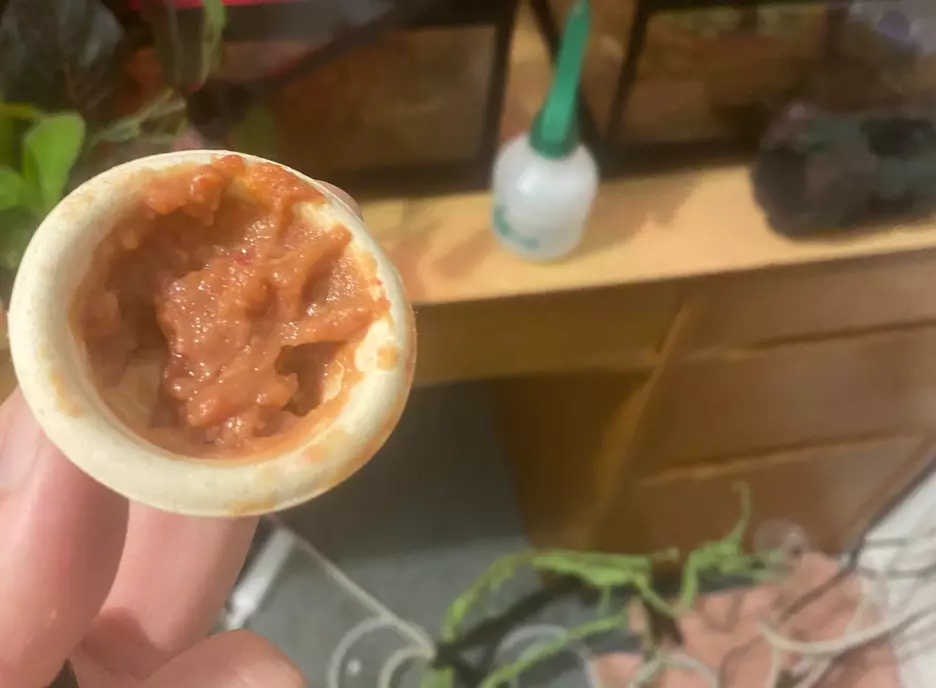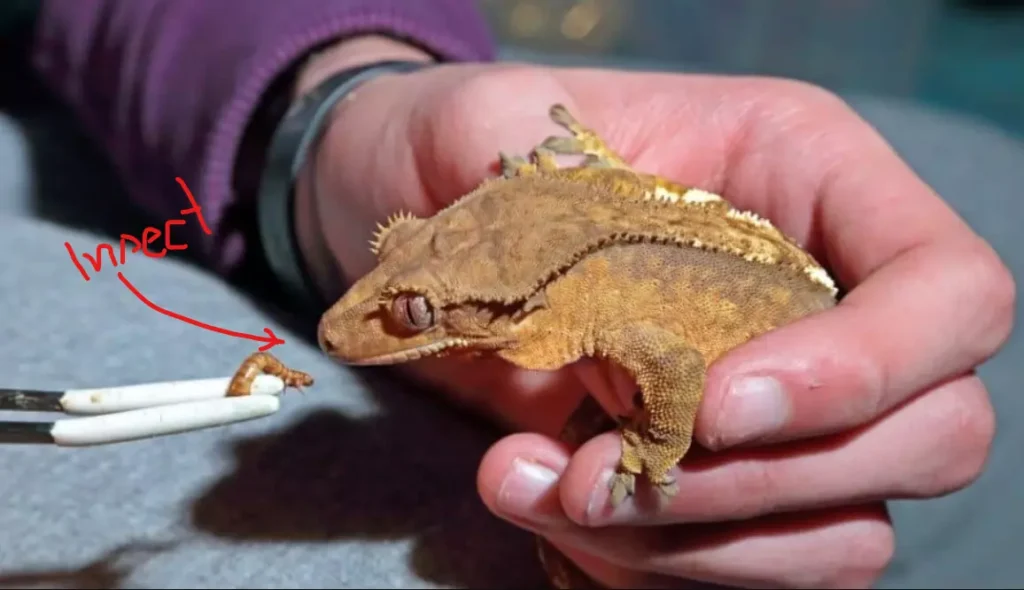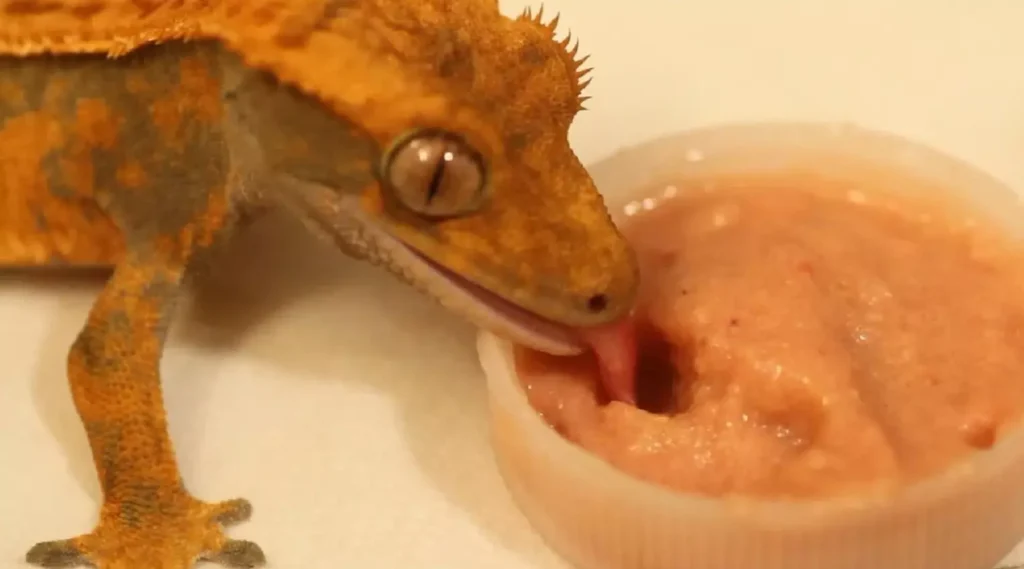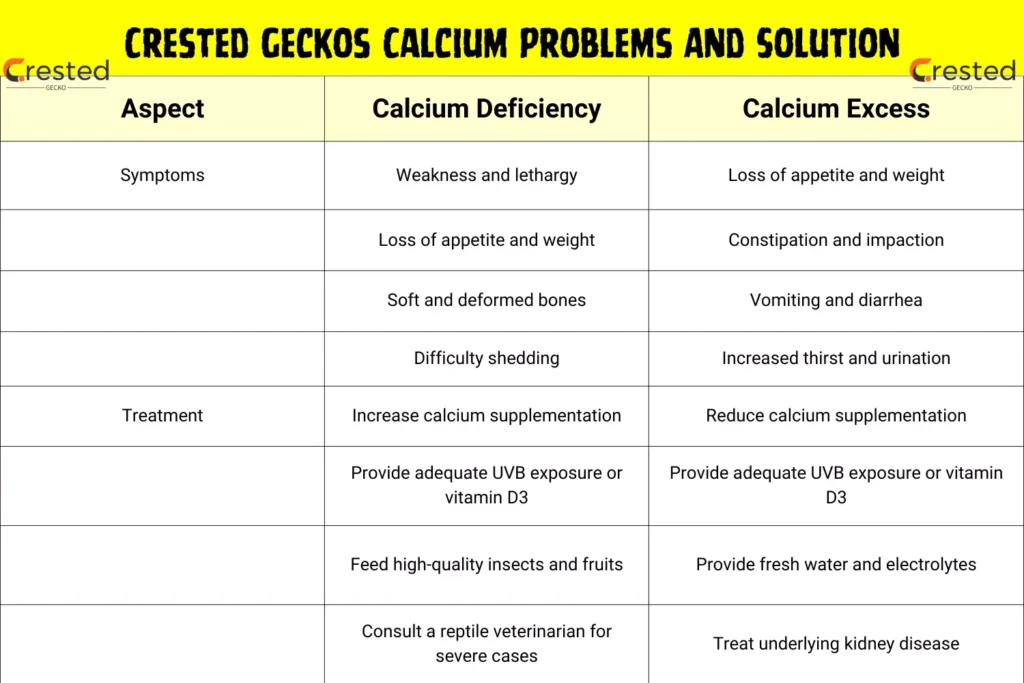Calcium is an essential mineral for crested geckos, cause it plays a vital role in their bone health, muscle function, nerve transmission, and egg production.
But do they really need calcium for their health?
In this article, I will discuss these questions with detailed explanations about calcium for crested geckos, such as how much they need, how to supplement it, and how to prevent or treat calcium problems.
Let’s dive in…
- Yes, Crested geckos do need calcium to keep their bones, muscles, and nerves healthy.
- Make sure their diet has a 2:1 calcium to phosphorus balance, and use calcium powder based on their diet, age, and exposure to UVB.
- Before feeding, sprinkle their insect prey with calcium supplements, or use UVB lighting to help them absorb calcium.
How Much Calcium Do Crested Geckos Need?

The amount of calcium that crested geckos need depends on several factors, such as their age, sex, diet, and environment.
However, a general rule of thumb is that crested geckos need twice as much calcium as phosphorus in their diet.
This is because phosphorus can mix with calcium and make it hard for the geckos to use.
1) Calcium to Phosphorus Ratio

The ideal calcium to phosphorus ratio (Ca:P) is 2:1. This means that for every 1 gram of phosphorus in their food, there should be 2 grams of calcium.
Foods with a good Ca:P ratio include:
- Insects like crickets, mealworms, waxworms, and black soldier fly larvae.
- Larvae such as silkworms and hornworms.
- Fruits like figs, kiwi, and blackberries.
On the other hand, foods with poor Ca:P ratios include:
- Insects like superworms and butterworms.
- Fruits like bananas, grapes, and apples.
- Vegetables like spinach, kale, and broccoli.
Limit or avoid these foods as much as possible because they can lead to calcium imbalances in your crested gecko’s body.
2) Calcium with or without D3
Calcium supplements come in two types: with or without vitamin D3. Vitamin D3 helps their bodies absorb calcium from food.
However, Crested geckos can produce vitamin D3 naturally when exposed to sunlight or artificial UVB light.
So, if your geckos don’t get enough UVB exposure due to indoor enclosures lacking UVB bulbs or UVB-blocking windows, you should use calcium with D3.
This can help prevent calcium deficiency and metabolic bone disease (MBD).
But If they receive enough UVB exposure from sunlight or UVB bulbs in their enclosures, use calcium without D3. This maintains their calcium balance without risking excess calcium.
How Often To Supplement Calcium

It also depends on their diet and age.
Crested geckos can eat a variety of foods, such as insects, fruits, and commercial diets.
Each type of food has a different amount of calcium and phosphorus and therefore requires a different amount of calcium supplementation.
A general guideline for calcium supplementation is:
- Insects: Dust with calcium powder every other feeding
- Fruits: Dust with calcium powder once a week.
- Commercial diets: Follow the manufacturer’s instructions.
The age of crested geckos also affects how often they need calcium supplementation.
Younger geckos need more calcium while older geckos need less calcium than younger geckos, as they have reached their adult size and have lower metabolic rates.
Here’s a basic calcium supplement schedule based on age:
- Hatchlings and juveniles: Add calcium with every meal.
- Adults: Add calcium every other meal.
Note: female crested geckos, especially during breeding season, require extra calcium because they lay eggs that demand a lot of calcium. To assist them, keep a small dish of calcium powder in their enclosure so they can lick it when needed.
How to Prevent or Treat Calcium Problems
To put it simply, you can help your pet by ensuring they have a balanced diet, receive ample sunlight, and visit the vet as recommended.
But remember, calcium problems can manifest in various ways, either through a deficiency or an excess.
Take a look at this chart displaying signs and solutions for calcium troubles in crested geckos:

F.A.Q.s
Q: How can I tell if my crested gecko has MBD?
MBD is a condition where the bones become soft and deformed due to lack of calcium.
Some signs of MBD in crested geckos are curved spine and limbs, swollen or broken bones, difficulty moving or climbing, loose teeth or jaw, and a lost tail.
Q: How can I tell if my crested gecko has hypercalcemia?
Hypercalcemia is a condition where the blood has too much calcium due to over-supplementation or excessive UVB exposure.
Some signs of hypercalcemia in crested geckos are loss of appetite and weight, constipation and impaction, vomiting and diarrhea, increased thirst and urination, kidney stones, and failure.
Q: What is the best calcium supplement for crested geckos?
There is no definitive answer to this question, as different supplements may suit different geckos depending on their diet and UVB exposure.
However, some general tips are: choose a reputable brand that has been tested for quality and purity; choose a supplement that has a 2:1 Ca:P ratio; choose a supplement that has vitamin D3 if your gecko does not receive enough UVB exposure; choose a supplement that does not have vitamin D3.

[…] UVB light helps provide a clear day/night cycle and provides all the vitamin D that your pet needs. […]
[…] dusting them with calcium and vitamin […]
[…] or mealworms a few times a week. Make sure these insects are well-fed with nutritious food and sprinkled with calcium and vitamin D3 powder before feeding. Use tweezers or a dish for feeding, and make sure the insects are no bigger […]
[…] Insects are essential for crested geckos because they offer necessary nutrients like protein, fat, calcium, phosphorus, and various vitamins for their health and growth. […]